

Asynchronous Processing (The Java Source) JUnit Tutorial for Unit Testing – The ULTIMATE Guide (PDF Download) EDITORIAL NOTE: We have provided plenty of JUnit tutorials here at Java Code Geeks, like JUnit Getting Started Example, JUnit Using Assertions and Annotations Example, JUnit Annotations Example and so on.
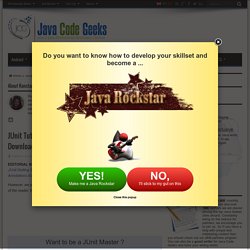
However, we prefered to gather all the JUnit features in one detailed guide for the convenience of the reader. We hope you like it! 1. Unit testing introduction 1.1. A unit can be a function, a class, a package, or a subsystem. Difference between Setter Injection vs Constructor Injection in Spring framework. Spring Setter vs Constructor Injection Spring supports two types of dependency Injection, using setter method e.g. setXXX() where XXX is dependency or via constructor argument.
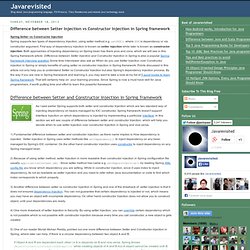
10 Books Every Java Developer Should Read. I have read my share of software development books and I have noticed that it is very rare to find a book which I want to read more than once.
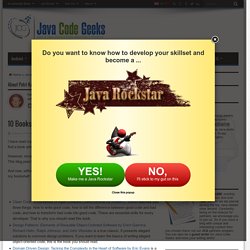
However, once in a while I find a book which teaches me new things every time when I read it. This blog post is a tribute to these rare gems. And now, without further delay, I present to you ten books which have earned a special place in my bookshelf: Spring Data, MongoDB and JSF Integration tutorial. Introduction to sample application (MongoShop Product Catalog) After this tutorial, a sample application (MongoShop Product Catalog) with the following functional requirement will be built: 1.
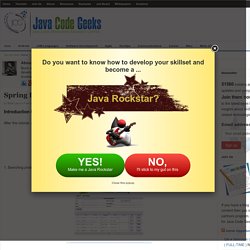
Searching product with different criteria (e.g. sku, product type, title, stc) Two Years of Experience Doesn’t make you “Senior” Two years of experience doesn’t make you “senior”.
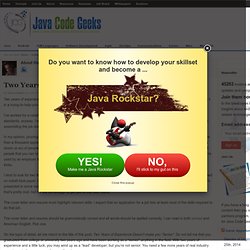
Except maybe in high school. I don’t mean this in a negative sort of way. I mean it in a trying-to-help-you-out sort of way. I’ve worked for a relatively small number of companies in my twenty-plus years of professional life. Small by the software industry’s standards, anyway. In my opinion, pruning through cover letters and resumes is the hardest part.
I tend to look for two things in an applicant: do they have the skills, and do they pay attention to detail. The cover letter and resume must highlight relevant skills. The cover letter and resume should be grammatically correct and all words should be spelled correctly. On the topic of detail, let me return to the title of this post: Two Years of Experience Doesn’t make you “Senior”. Reference: Two Years of Experience Doesn’t make you “Senior” from our JCG partner Wayne Beaton at the Eclipse Hints, Tips, and Random Musings blog. Are frameworks making developers dumb? Last week I got to take interviews to hire senior java developers with around 5 years of experience.
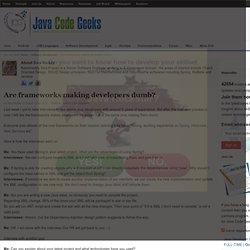
But after the interview process is over I felt like the frameworks makes developers life easier but at the same time making them dumb. Everyone puts almost all the new frameworks on their resume claiming they have “Strong, working experience on Spring, Hibernate, Web Services etc”. Here is how the interviews went on. Hadoop MapReduce Concepts. What do you mean by Map-Reduce programming?
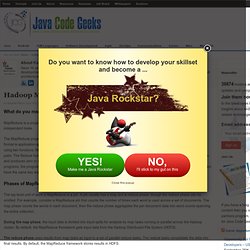
MapReduce is a programming model designed for processing large volumes of data in parallel by dividing the work into a set of independent tasks. The MapReduce programming model is inspired by functional languages and targets data-intensive computations. The input data format is application-specific, and is specified by the user.
The output is a set of <key,value> pairs. The user expresses an algorithm using two functions, Map and Reduce. Auditing entities in Spring Data MongoDB. 115 Java Interview Questions and Answers – The ULTIMATE List. In this tutorial we will discuss about different types of questions that can be used in a Java interview, in order for the employer to test your skills in Java and object-oriented programming in general.
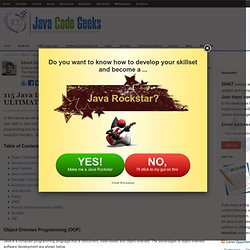
In the following sections we will discuss about object-oriented programming and its characteristics, general questions regarding Java and its functionality, collections in Java, garbage collectors, exception handling, Java applets, Swing, JDBC, Remote Method Invocation (RMI), Servlets and JSP. Let’s go…! Table of Contents Object Oriented Programming (OOP) Java is a computer programming language that is concurrent, class-based and object-oriented. Java 8 Features - The ULTIMATE Guide.
EDITORIAL NOTE: It’s been a while since Java 8 is out in the public and everything points to the fact that this is a really major release.
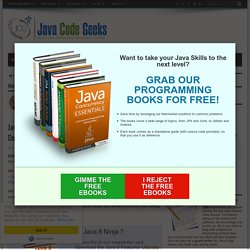
We have provided an abundance of tutorials here at Java Code Geeks, like Playing with Java 8 – Lambdas and Concurrency, Java 8 Date Time API Tutorial : LocalDateTime and Abstract Class Versus Interface in the JDK 8 Era. We also referenced 15 Must Read Java 8 Tutorials from other sources. Of course, we examined some of the shortfalls also, like The Dark Side of Java 8. Now, it is time to gather all the major Java 8 features under one reference post for your reading pleasure. Top 10 Java Books you don’t want to miss. We learn by reading books and experimenting on it.
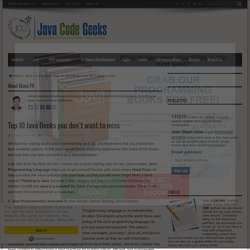
So, it is imperative that you choose the best available options. Things Every Programmer Should Know. At ui-programming, one of our JCG program participant sites, articles about “Things Every Programmer Should Know” are occasionally posted. As stated in the author’s first post, the 97 Things Every Programmer Should Know project, pearls of wisdom for programmers collected from leading practitioners.
The collection is intended simply to contain multiple and varied perspectives on what it is that contributors to the project feel programmers should know. This can be anything from code-focused advice to culture, from algorithm usage to agile thinking, from implementation know-how to professionalism, from style to substance, etc. JAXB marshal example. In this example we are going to show how to use the JAXB marshal functionalities.
JAXB offers the possibility to convert Java objects into XML structures and vice versa, it comes with the JRE bundle since the first versions of the JRE 1.6. As example, we are going to create a list of museums and store it in a specific XML file, each museum contains information like its name, about permanent and special exhibitions, city where is located, etc. The java version used for these examples is the JRE 1.8.0 for 32b but only the usage of the LocalDate class is Java 8 specific; any 1.7 version can be used. The IDE used is Eclipse SDK Version: Luna (4.4) but the code should work in any other IDE supporting java. So, here we go… Lambda Expressions and Stream API: basic examples. This blog post contains a list of basic Lambda expressions and Stream API examples I used in a live coding presentation I gave in June 2014 at Java User Group – Politechnica Gedanensis (Technical University of Gdańsk) and at Goyello.
Lambda Expressions Syntax The most common example: One can write this differently: What about arguments? And expanding to full expression: Functional interface. Why I will use Java EE instead of Spring in new Enterprise Java Projects in 2012. The question comes up often. It came up in my new project in November 2011, too. I will use Java EE (JEE) instead of the Spring framework in this new Enterprise Java project. I know: Several articles, blogs and forum discussions are available regarding this topic. WebSphere Developer Technical Journal: The top Java EE best practices. From the IBM WebSphere Developer Technical Journal. Introduction Over nearly the entire last decade, much has been written about Java™ Platform, Enterprise Edition (Java EE) best practices. There are now dozens of books and hundreds (perhaps more) of articles that provide insight into how Java EE applications should be written. In fact, there are so many resources -- often with contradictory recommendations -- that merely navigating this maze has itself become an obstacle to adopting Java EE.
Therefore, to provide some simple guidance for customers entering this world, we have compiled this best-of-the-best list of what we feel are the most important and significant best practices for Java EE. Back to top The best of the best practices. Java Best Practice:10 Most Useful Java Best Practice Quotes for Java Developers. Quote 1: Avoid creating unnecessary objects and always prefer to do Lazy Initialization. Java Best Practices.